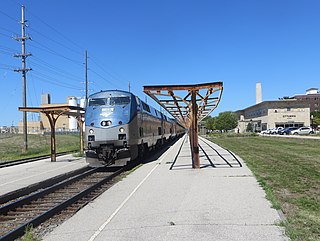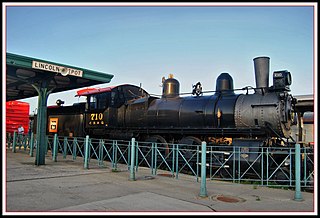
The Chicago, Burlington and Quincy Railroad was a railroad that operated in the Midwestern United States. Commonly referred to as the Burlington Route, the Burlington, CB&Q, or as the Q, it operated extensive trackage in the states of Colorado, Illinois, Iowa, Missouri, Nebraska, Wisconsin, Wyoming, and also in Texas through subsidiaries Colorado and Southern Railway, Fort Worth and Denver Railway, and Burlington-Rock Island Railroad. Its primary connections included Chicago, Minneapolis–Saint Paul, St. Louis, Kansas City, and Denver. Because of this extensive trackage in the midwest and mountain states, the railroad used the advertising slogans "Everywhere West", "Way of the Zephyrs", and "The Way West".

The American Royal Zephyr was a streamlined passenger train service operated by the Chicago, Burlington and Quincy Railroad between Chicago and Kansas City. This CB&Q Zephyr was named for the American Royal, one of the Midwest's largest and oldest livestock exhibition, professional rodeo, and horse show.

The Kansas City Zephyr was a streamliner passenger train service operated by the Chicago, Burlington and Quincy Railroad (CB&Q) between Chicago and Kansas City.

Plano station, also known as the Chicago, Burlington and Quincy Railroad Depot is an Amtrak intercity train station in Plano, Illinois, United States. The station was added to the U.S. National Register of Historic Places on November 12, 1993.

Galesburg is an Amtrak intercity train station in Galesburg, Illinois, United States. The station was originally built in 1984, after the razing of the large depot just south of the current site. It is located north of the large BNSF Railway classification yard. Just south the Illinois Zephyr and Carl Sandburg diverge via the Quincy main line which bypasses the yard on the east side. The California Zephyr and the Southwest Chief continue to the southwest side of Galesburg near Knox College.

Burlington station is an Amtrak train station in Burlington, Iowa, United States. It is served by the California Zephyr, with one daily train in each direction. The station was built by the Chicago, Burlington and Quincy Railroad (CB&Q) in 1944, replacing the previous union station used by the CB&Q and the Chicago, Rock Island and Pacific Railroad. That station burned in January 1943.

Ottumwa station is an Amtrak intercity train station in Ottumwa, Iowa, United States. The station was originally built by the Chicago, Burlington and Quincy Railroad, and has been listed as Burlington Depot by the National Register of Historic Places since November 26, 2008. It became a contributing property in the Historic Railroad District in 2011.

Osceola station is an Amtrak intercity train station in Osceola, Iowa, United States served by Amtrak. Osceola is the closest Amtrak station to Des Moines, Iowa's capital and most populous city, which is about 50 miles (80 km) to the north. The station is listed on the National Register of Historic Places as Chicago, Burlington and Quincy Depot.

The Batavia Depot Museum is a museum in Batavia, Illinois that was once the town's primary train station. It was the first of many depots built by the Chicago, Burlington and Quincy Railroad. It was listed on the National Register of Historic Places in 1979 as the Chicago, Burlington, and Quincy Railroad Depot.

Union Station, also known as Union Station and Burlington Freight House, is located along the riverfront in downtown Davenport, Iowa, United States. It is listed on the National Register of Historic Places. The buildings are in a section of downtown with several historic structures. Across Ripley Street to the west is the Chicago, Milwaukee, St. Paul and Pacific Freight House, and to the east across Harrison Street is the Dillon Memorial. On River Drive northwest from the Burlington Freight House is The Linograph Company Building. Across Beiderbecke Drive to the south are the W.D. Petersen Memorial Music Pavilion and the Mississippi River.

Wyoming was a Chicago, Burlington and Quincy Railroad station in Wyoming, Illinois. Now the headquarters of the Rock Island Trail State Park, the building is listed on the National Register of Historic Places as the Chicago, Burlington & Quincy Railroad Depot. The station has also been restored to the original red color.

Galesburg Santa Fe Station was a railway station in the west central Illinois town of Galesburg. The station was along the Atchison, Topeka and Santa Fe Railway's main line and served trains such as the Super Chief and El Captain. After Amtrak took over intercity rail in the United States, it was served by trains such as the Lone Star (1971–1979) and the Southwest Chief (1971–1996).

Centerville station, now known as the Appanoose County Post 526 VFW Hall, is an historic train station located in Centerville, Iowa, United States. The Chicago, Burlington and Quincy Railroad (CB&Q) bought the Keokuk & Western Railroad in 1903. Centerville served as a dividing point on the line and by 1910 the people in the town started to plan for a larger station. Its architect is unknown, but the depot was probably designed by a CB&Q architect using fairly standard plans that were used by the railroad at the time. Construction of the Prairie School style building began in July 1911 and it was completed in February of the following year. Local contractor B.S. Staley built the building. The building was used by the CB&Q until 1982. It was bought by the Appanoose County VFW post for their meeting hall in 1990 and it was listed on the National Register of Historic Places in 2003 as the CB&Q Passenger Depot.

The Burlington, Cedar Rapids & Northern Freight House, also known as the Rock Island Freight House, is a historic building located in Burlington, Iowa, United States. It was listed on the National Register of Historic Places in 1983.

Keokuk Union Depot is a historic train station on the west bank of the Mississippi River near downtown Keokuk, Iowa, United States. It was built from 1890 to 1891, and it was listed on the National Register of Historic Places in 2013.

Creston station is an Amtrak intercity train station in Creston, Iowa. The station is served by the Chicago–San Francisco Bay Area California Zephyr. Constructed by the Chicago, Burlington and Quincy Railroad (CB&Q) and opened in 1899, the station is listed on the National Register of Historic Places as the Chicago, Burlington and Quincy Railroad-Creston Station. Amtrak moved to the historic station in 2019 from a small station immediately to its east that had been used since 1969. Creston station is also used by the city of Creston as a city hall and community center, known as the Creston Municipal Complex.

Chicago, Burlington and Quincy 4963 is a preserved class "O-1a" 2-8-2 "Mikado" type steam locomotive originally built by the Baldwin Locomotive Works in 1923 for the Chicago, Burlington and Quincy Railroad. It was used by the CB&Q to haul mainline freight trains before it was leased to the Bevier and Southern Railroad to haul short-distance freight trains in the early 1960s. It was subsequently retained by the CB&Q and used as a source of spare parts before being acquired by Richard Jensen.

Grand Island station, otherwise known as the Burlington Railroad Depot in Grand Island, Nebraska is a historic railroad station which served trains of the Chicago, Burlington and Quincy Railroad. The Prairie style station was constructed in 1911. It was likely designed by Walter T. Krausch, who designed many CB&Q depots, however the documentation of the depot was lost in a 1922 fire.

Chicago Burlington & Quincy 710 is a preserved 4-6-0 "Ten Wheeler" type steam locomotive on display at the former Lincoln station in Lincoln, Nebraska. Built in 1901, No. 710 was built for high speed passenger service. After a rebuild in 1928, the locomotive provided branch line passenger and freight service until its retirement in 1954.

The Galesburg Yard is a classification yard of the BNSF Railway south of Galesburg in Illinois. It dates back to a goods and classification yard of the Chicago, Burlington and Quincy Railroad (CB&Q), which from 1905 developed into one of the largest classification yards in the USA. At the beginning of the 20th century, Galesburg developed into CB&Q's most important railroad junction, with the main lines from Saint Paul to St. Louis and Kansas City (north-south) and from Chicago to Omaha and Kansas City (east-west) running through it. Nearly all CB&Q's passenger and freight trains passed through Galesburg, where there was also a large railroad depot with several roundhouses.





















